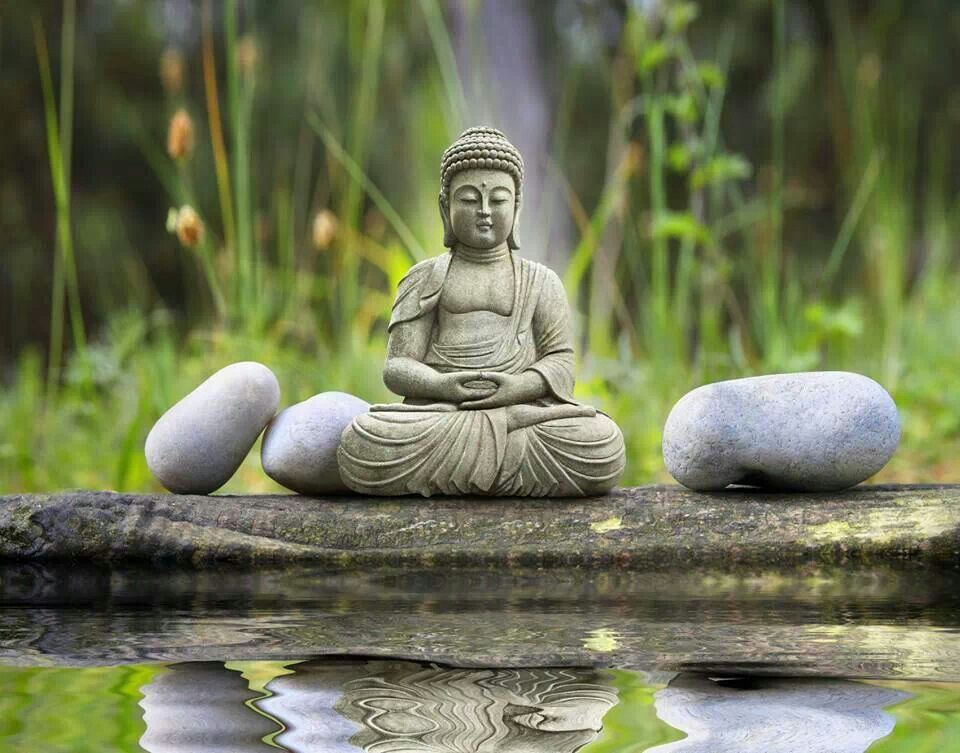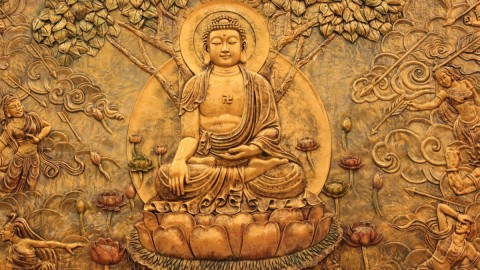Live a simple life of needs being fulfilled, with no mad desires. You need food, you need clothing, you need a shelter – finished. You need somebody to love, you need somebody to be loved by. Love, food, shelter – simple; but you create millions of desires. If you need a Rolls Royce then difficulties arise. If you need a palace, or you are not satisfied with ordinary womankind, you need a Miss Universe – and all your Miss Universes are almost dead – you need something impossible: then you go on and on. And you have to go on postponing, ‘Someday, when I have a palace, then I will sit silently.’ But in the meanwhile life is flowing out of your fingers. If ever it should happen that you acquire your palace, you will have forgotten how to sit silently because, running after the palace, you will completely forget how to sit. That happens to all ambitious people – they run. Then running becomes their very way of life. A moment comes when they have achieved, but now they cannot stop. You know it well, that if for the whole day you have been thinking and thinking, you cannot stop.
Mulla Nasrudin once came home after having decided that day to do something and not forget it. He had put a knot in his clothing so that he would remember.
Then, when he got home, he was frantic because he had forgotten. ‘The knot is there, but for what?’ He tried to think. His wife insisted, ‘Now you go to sleep and tomorrow morning we’ll see.’ But he said, ‘No, it is something very important. It was important and I had decided to do it tonight. At no cost can I neglect it, so you go to sleep.’ In the middle of the night when the clock chimed two, he remembered. He had decided to go to bed early. That was what the knot was for.
This is happening to all ambitious people. They desire so much, and by the time they reach their goal they have completely forgotten for what they were reaching. In the first place, for what were they desiring so many things? Now they have achieved and they have forgotten. Even if they remember that they had wanted to be silent, relaxed, to enjoy life, now their whole pattern of life and the whole conditioning will not allow them to relax, will not allow them to sit silently and enjoy. When you run with ambition for your whole life, you cannot stop easily. Running becomes your very being. If you want to stop, this is the moment. There is no future for it, this is the moment.
Needs are simple. A man can live a very simple, austere life and enjoy it. Rich food is not needed to enjoy food, only a rich tongue is needed. By the time you are able to accumulate rich food, you will have lost the very capacity to enjoy it.
Enjoy it while the moment is still there. Enjoy it while you are alive. Don’t waste it and don’t postpone it.
An austere man lives moment to moment – ‘This day is enough for itself, and tomorrow will take care of itself.’ Says Jesus again and again, ‘Look at the lilies of the field, at how beautiful they are. They don’t bother about the morrow. Even Solomon was not so beautiful in the moments of his greatest glory as ordinary lily-flowers in the field.’ Look at these birds, they are enjoying themselves. This very moment the whole existence is celebrating – except you.
What is the trouble with man? The trouble is that he thinks that for enjoyment certain conditions have to be fulfilled first; this is the trouble. To enjoy life in fact no conditions are to be fulfilled; it is an unconditional invitation. But man thinks that certain conditions have to be fulfilled first; only then can he enjoy life. This is the complex mind. The simple mind feels that one has to enjoy whatsoever is available. Enjoy it! No conditions are to be fulfilled. And the more you enjoy this moment, the more capable you become of enjoying the next. The capacity grows; the greater and greater it becomes, the higher and higher it goes – it is infinite.
And when you come to the infinity of enjoyment, that is what God is. God is not a person sitting somewhere and waiting for you. By this time He will have gotten bored, waiting and waiting for you. He will have committed suicide if He had any sense… waiting for you.
God is not a person. He is not a goal, He is a way of enjoying life right here and now. God is the attitude of being blissful for no reason at all. You are miserable for no reason at all; that is the complex mind.
I saw Mulla Nasrudin one day following the body of a rich man who had died.
The whole town was following, and Mulla Nasrudin was crying and weeping so hard. So I asked him, ‘What is the matter, Nasrudin? Were you in some way related to the rich man?’ He said, ‘No.’ ‘Then why are you weeping?’ I asked. He said, ‘Because I was not related to him, that’s why!’ People are weeping because they are related; people are weeping because they are not related. It seems that you want to weep whatsoever is the case. You are miserable for no reason at all. I have not come across a single person who really has any reason to be miserable. You create it. Because it looks absurd to be miserable without any reason, you create the reason. You rationalize, you find out, you invent; you are great inventors. And when you have found the reason or created a reason, invented one, then you are at ease. Now nobody can say that you are miserable without a reason.
In fact, the situation is this: there is no cause for any misery and there is no cause for any bliss. It just depends on your attitude. If you want to be happy, you can be, whatsoever the situation; the situation is irrelevant. To be happy is a capacity; in spite of the situation you can be happy. But if you have decided to be miserable you can be miserable in spite of the situation; the situation is irrelevant. If even in heaven you are received, welcomed, you will be miserable; you will find some reason or other.
It was asked of a great mystic, a Tibetan mystic, Marpa, ‘Are you certain that when you die you will go to heaven?’ He said, ‘Absolutely!’ The man said, ‘But how can you be so certain? You have not died, and you don’t know what God has in His mind.’ Marpa said, ‘I’m not worried about God’s mind, that is His business. I am certain because of my mind. Wherever I am, I will be happy and it will be heaven, so it makes no difference whether I am thrown to hell or to heaven – it is irrelevant.’
I have heard a beautiful anecdote about Adolf Hitler. He came to know from his friends that there was a Jewish woman, a great astrologer, and whatsoever she had been predicting had always been true. Hitler was a little reluctant because the woman was a Jew. But then the idea haunted his mind; he couldn’t sleep for days: ‘If the woman can really predict the future, then it is worth asking, even if she is a Jew.’ The woman was called secretly. Hitler asked, ‘Can you tell me when I am going to die?’ The woman closed her eyes, contemplated and said, ‘On a Jewish holiday.’ Hitler said, ‘What do you mean, what holiday?’ She said, ‘That is irrelevant. Whenever you die it will be a Jewish holiday.’
Marpa said, ‘It is irrelevant what God has in His mind. Wherever I go, it will be heaven – because I know, I am happy without any cause.’
An austere man comes to know that happiness is the nature of life. You need not have any causes to be happy. You can simply be happy just because you are alive! Life is happiness, life is bliss; but this is possible only for an austere man. A man who accumulates things always thinks that because of these things he is going to be happy. Palaces, money, gadgets; he thinks that because of these things he is going to be happy. Riches are not the problem; the attitude of the man who tries to find riches is the problem. The attitude is: unless I have all these things, I cannot be happy. This man will always remain unhappy. An austere man comes to know that life is so simple that whatsoever he has, he can be happy. He need not postpone it for anything else.
Austerity will then mean: come down to your needs; desires are mad, needs are natural. Food, shelter, love; bring your whole life energy down just to the level of needs, and you will be happy. And a happy man cannot be other than religious; and an unhappy man cannot be other than irreligious. He may pray, he may go to the temple and the mosque – that doesn’t matter. How can an unhappy man pray? His prayer will have a deep complaint in it, a grudge. It will be a deep grump. Prayer is gratitude, not complaint.
Only a happy man can be grateful; his whole heart cries in total gratitude, tears come to his eyes because God has given so much without his asking. And God has given so much just by giving you life. A happy man is happy just because he can breathe – that is too much. Just to breathe for a single moment is enough, more than enough. Life is such a benediction! – But an unhappy man cannot see it.
So remember, the more you are possession oriented, the less happy you will be.
The less happy you are, the farther away from the Divine, from prayer, from gratitude you will be. Be austere. Live with the necessary and forget about desires; they are fantasies in the mind, ripples in the lake. They only disturb you, they can never lead you to any contentment.
… AUSTERITY, SELF STUDY AND SURRENDER TO GOD.>>>
They are all interlinked. If you are simple you will be able to observe yourself. A complex man cannot observe himself because he is so divided. He has so many things around him: so many desires, so many thoughts, and so many problems arising out of these desires and thoughts. He is continuously in a crowd. It is difficult to attain, to self study. Only an austere man eats, sleeps, loves, and that is all. He has ample time and ample energy left to observe, just to be, just to sit and look. And he is so happy. He has eaten well, the hunger has been satiated; he has loved well, the deeper hunger of being has been satiated. Now what to do? He sits, looks at himself, closes his eyes, watches his own being. There is not a crowd, nothing much to be done. Things are so simple that he can do them easily. And simple things have a quality that even while doing them you can study yourself. Complex things are too much for the mind. It gets too involved and fragmentary, and self study becomes impossible.
What Patanjali means by self study is the same as what Gurdjieff meant by self remembering, or what Buddha meant by right mindfulness, or what Jesus meant by becoming more alert, or what Krishnamurti means when he goes on saying to be aware. When you have nothing to do, nothing much to do, the simple things of the day finished, where will the energy move? What will become of your energy? Right now you are always low, low in your energy, because there are so many engagements for the energy, so many involvements for the energy. You never have enough energy. And without energy there is no possibility of being aware, because awareness is the subtlest transformation of energy. It is the cream of your energy. If you don’t have enough overflowing energy, you can not be aware. At the point of low energy, low level energy, you cannot be aware; overflowing energy is needed. An austere man has so much energy left – what to do with this energy? All that can be done has been done; the day is over. You are sitting silently; the energy moves to the subtlest layers – it goes higher and higher, it goes on accumulating, it becomes a pinnacle, a pillar of energy. You can study yourself now. Even the subtlest nuances of your thoughts, emotions, feelings, you can watch.
… SELF-STUDY AND SURRENDER TO GOD.
Whenever you watch, you are no longer there. Austerity leads to self study; self study leads to egolessness, because you are not there. The more you know yourself, the less you are. Only ignorant people are. Enlightened people are not.
They are like an emptiness, they are like a vast sky. If you enter a Buddha you will never find him anywhere. You will find infinite space, but nobody there. If you enter me you will not find me there – an emptiness, a vast sky, total freedom for you. You will not stumble upon me; I am not there. When you become more and more aware inside, you are less and less. It is always in the same proportion: the more unaware you are, the more you are; the more aware you are, the less you are. When you become perfectly aware, you are not. The whole energy has become awareness; nothing is left for the ego. And then the ego is left, just as a snake moves out of an old skin. Now it is a dead skin lying there; anybody can take it. Then surrender to God happens. You cannot surrender to God because you are the barrier.
People come to me and they say, ‘I would like to surrender.’ That’s not possible.
How can you surrender? You are the non-surrender. When you are not, surrender is. When you cease, surrender happens. So remember, you cannot surrender. It can not be an effort on your part – it is impossible. You can do only one thing, what Patanjali is saying: be austere, simple. So much energy is then left which spontaneously becomes awareness, and in awareness you are not there. Suddenly, you find that the surrender has happened. Suddenly, without doing anything on your part… you have not done anything and the surrender has happened. Surrender to God is the state of non ego within you. It is not an act on your part, there is no effort in it. If there is effort, it is not surrender.
Surrender is a realization. When you are aware and the flame is burning high, suddenly you realize that the darkness is not there. You are surrendered; it is a revelation, a realization. Suddenly you are amazed! You are absent and God is there. In your absence is God, in your presence is only misery. In your presence nothing is possible, in your absence the whole infinity becomes possible. These are interrelated things: austerity, self study and surrender to God.
Tags: Patanjali Yoga Sutra 16.1 Overflowing Energy










